
crewAI-quickstart
A collection of notebooks and recipes showcasing fun and effective ways to use CrewAI's agentic workflow implementations and tools.
Stars: 209
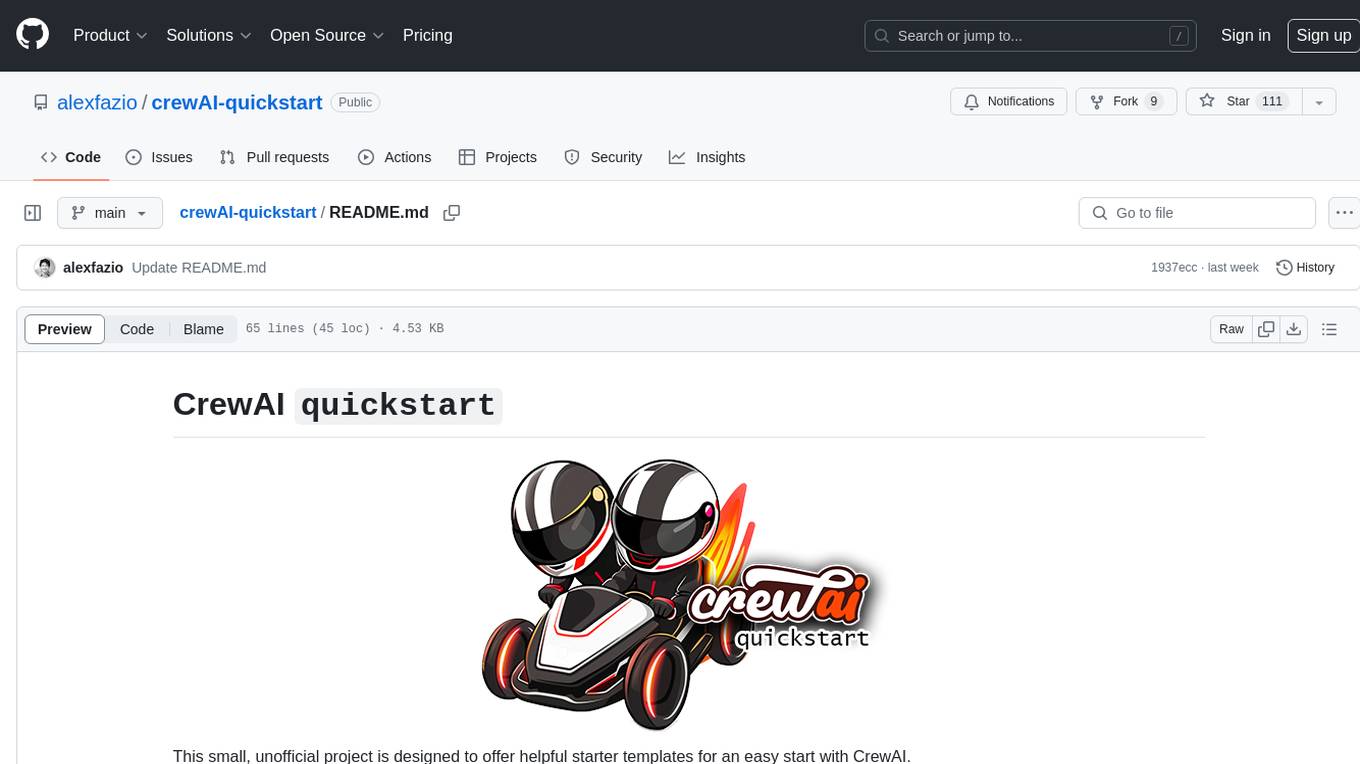
CrewAI quickstart is a small project providing starter templates for an easy start with CrewAI. It includes notebooks, Python scripts, GUI with Streamlit, and Local LLMs for various tasks like web search, CSV lookup, web scraping, PDF search, and more. Contributions are welcome to enhance the project.
README:
CrewAI Quickstart provides code templates and guides designed to help developers build with CrewAI, offering copy-able code snippets that you can easily integrate into your own projects.
To make the most of the examples in this quickstart guide, you'll need to be familiar with CrewAI. We recommend reviewing the official CrewAI documentation at https://docs.crewai.com/ to understand the basic concepts and functionality. You'll also need an API key from one of the major Language Model providers such as Anthropic, OpenAI, Groq, or Cohere.
| Tool Name | Description | Notebook Link |
|---|---|---|
| TXTSearchTool | RAG tool for searching within text (.txt) files | Sequential .txt Search Notebook |
| CodeDocsSearchTool | RAG tool for searching through code documentation | Sequential Code Docs Search Tool Notebook |
| CodeInterpreterTool | Tool for interpreting Python code | Sequential Code Interpreter Notebook |
| ComposioTool | Enables use of Composio tools | Sequential Composio SDK Tool Notebook |
| CSVSearchTool | RAG tool for searching within CSV files | Sequential CSV lookup Notebook |
| DirectoryReadTool | Facilitates reading of directory structures | Sequential Directory Read Tool Notebook |
| DOCXSearchTool | RAG tool for searching within DOCX documents | Sequential DOCX Search Notebook |
| GithubSearchTool | RAG tool for searching within GitHub repositories | Sequential GitHub Search Notebook |
| BrowserbaseLoadTool | Tool for interacting with web browsers | Sequential Headless Browser Notebook |
| JSONSearchTool | RAG tool for searching within JSON files | Sequential JSON Search Notebook |
| MDXSearchTool | RAG tool for searching within Markdown (MDX) files | Sequential MDX Search Notebook |
| PDFSearchTool | RAG tool for searching within PDF documents | Sequential PDF Search Notebook |
| PGSearchTool | RAG tool for searching within PostgreSQL databases | Sequential PostgreSQL Search Notebook |
| ScrapeWebsiteTool | Facilitates scraping entire websites | Sequential Web Scraping Notebook |
| SeleniumScrapingTool | Web scraping tool using Selenium | Sequential Web Scraping (Selenium) Notebook |
| SerperDevTool | Specialized tool for development purposes | Sequential Web Search Notebook |
| WebsiteSearchTool | RAG tool for searching website content | Sequential Website Search Notebook |
| XMLSearchTool | RAG tool for searching within XML files | Sequential XML Search Notebook |
| YoutubeChannelSearchTool | RAG tool for searching within YouTube channels | Sequential YouTube Channel Search Notebook |
| YoutubeVideoSearchTool | RAG tool for searching within YouTube videos | Sequential YouTube Video Search Notebook |
The CrewAI Quickstart thrives on the contributions of the developer community. We value your input, whether it's submitting an idea, fixing a typo, adding a new guide, or improving an existing one. By contributing, you help make this resource even more valuable for everyone.
To avoid duplication of efforts, please review the existing issues and pull requests before contributing.
If you have ideas for new examples or guides, share them on the issues page.
Thanks to @AbubakrChan for his contribution to the 🖼️ GUI w/ Streamlit .py templates.
This project is licensed under the MIT License.
Happy learning and coding with CrewAI!
For Tasks:
Click tags to check more tools for each tasksFor Jobs:
Alternative AI tools for crewAI-quickstart
Similar Open Source Tools

crewAI-quickstart
CrewAI quickstart is a small project providing starter templates for an easy start with CrewAI. It includes notebooks, Python scripts, GUI with Streamlit, and Local LLMs for various tasks like web search, CSV lookup, web scraping, PDF search, and more. Contributions are welcome to enhance the project.
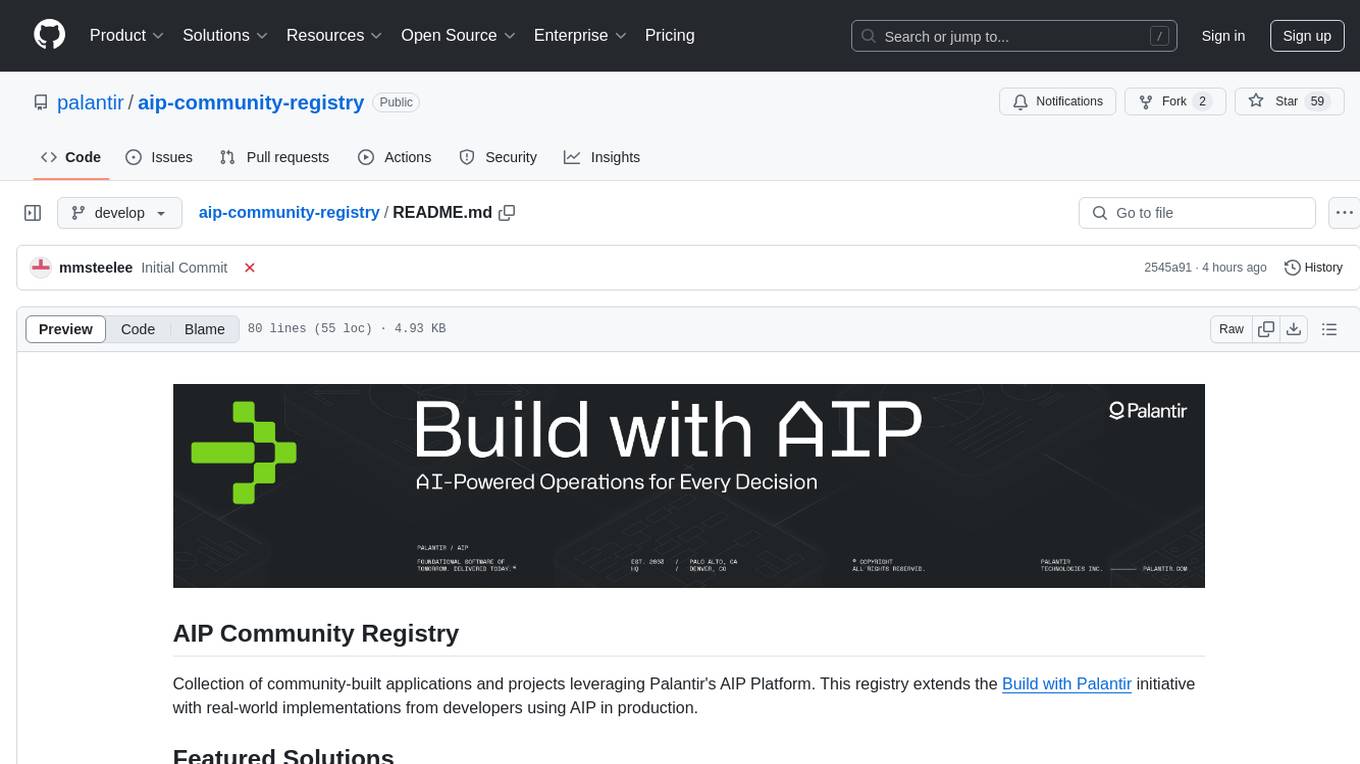
aip-community-registry
AIP Community Registry is a collection of community-built applications and projects leveraging Palantir's AIP Platform. It showcases real-world implementations from developers using AIP in production. The registry features various solutions demonstrating practical implementations and integration patterns across different use cases.
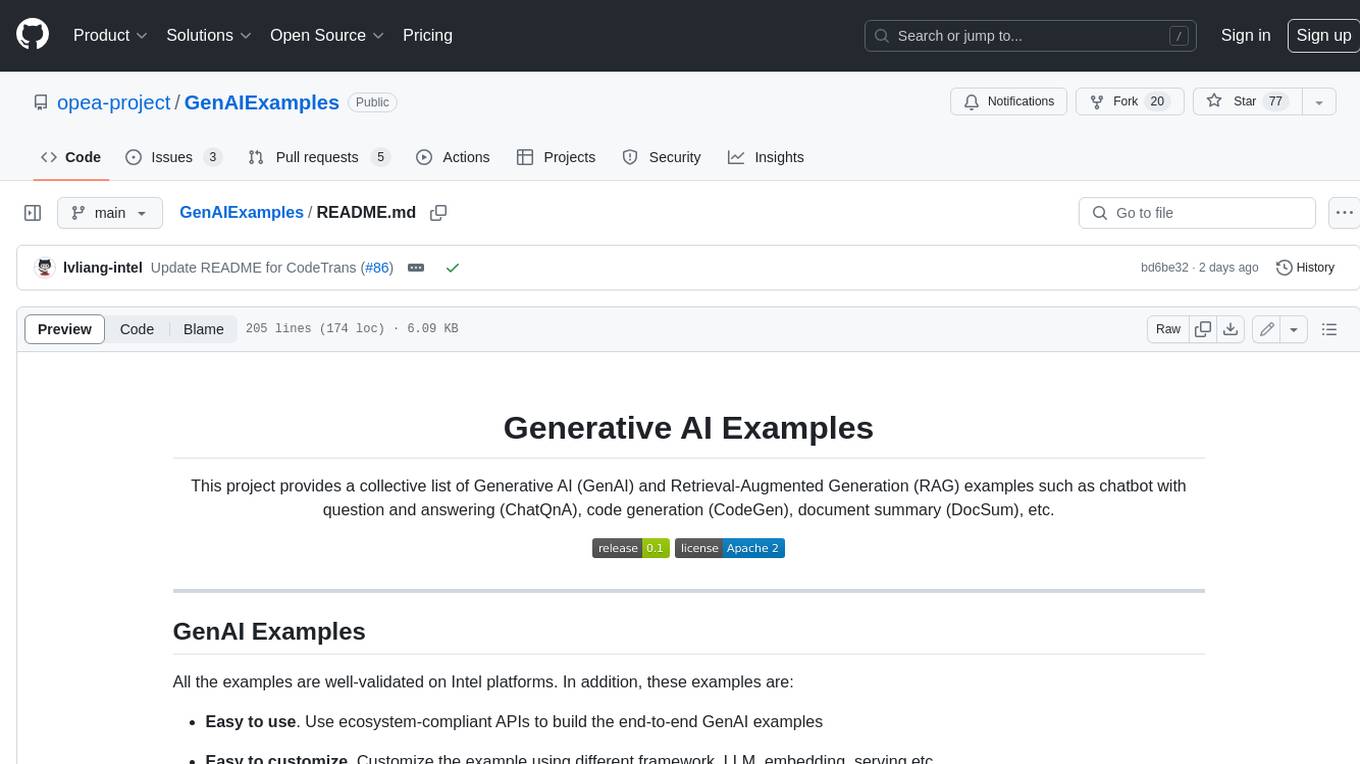
GenAIExamples
This project provides a collective list of Generative AI (GenAI) and Retrieval-Augmented Generation (RAG) examples such as chatbot with question and answering (ChatQnA), code generation (CodeGen), document summary (DocSum), etc.
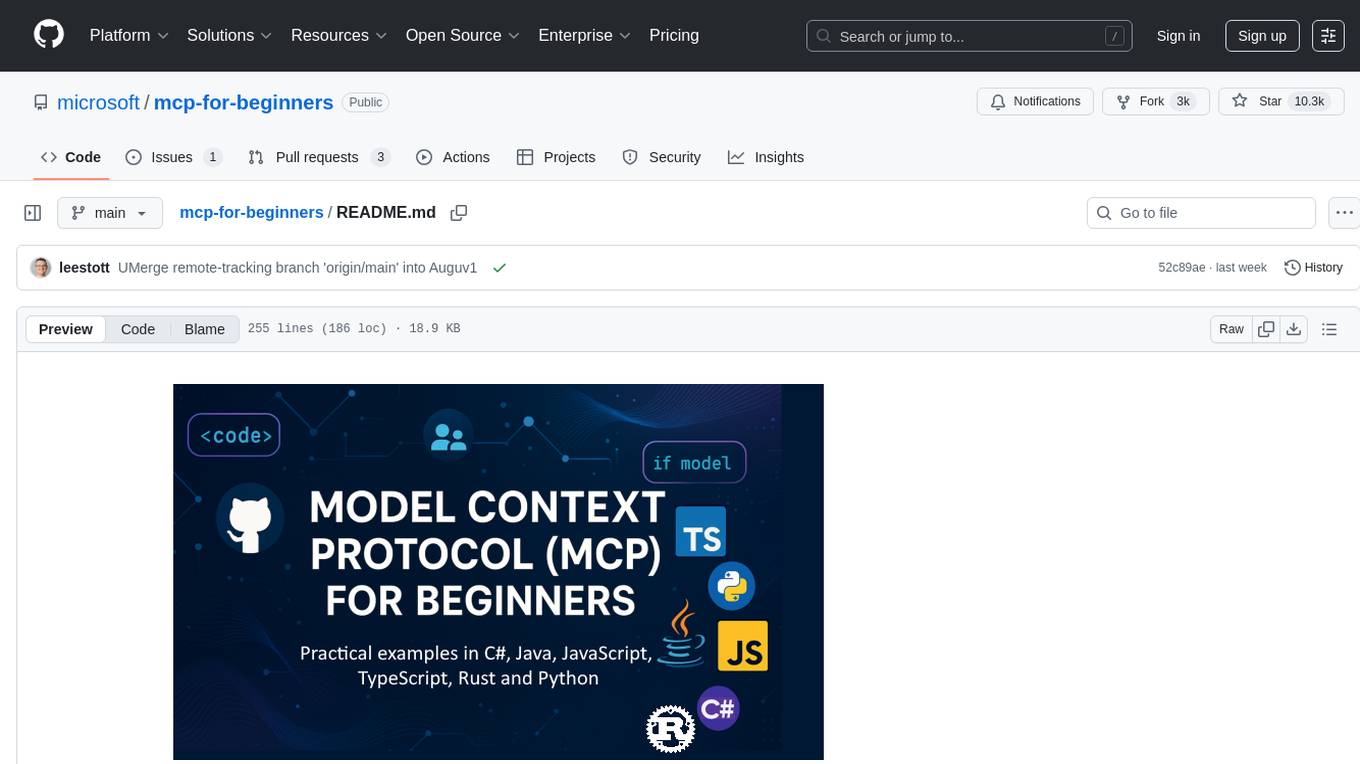
mcp-for-beginners
The Model Context Protocol (MCP) Curriculum for Beginners is an open-source framework designed to standardize interactions between AI models and client applications. It offers a structured learning path with practical coding examples and real-world use cases in popular programming languages like C#, Java, JavaScript, Rust, Python, and TypeScript. Whether you're an AI developer, system architect, or software engineer, this guide provides comprehensive resources for mastering MCP fundamentals and implementation strategies.
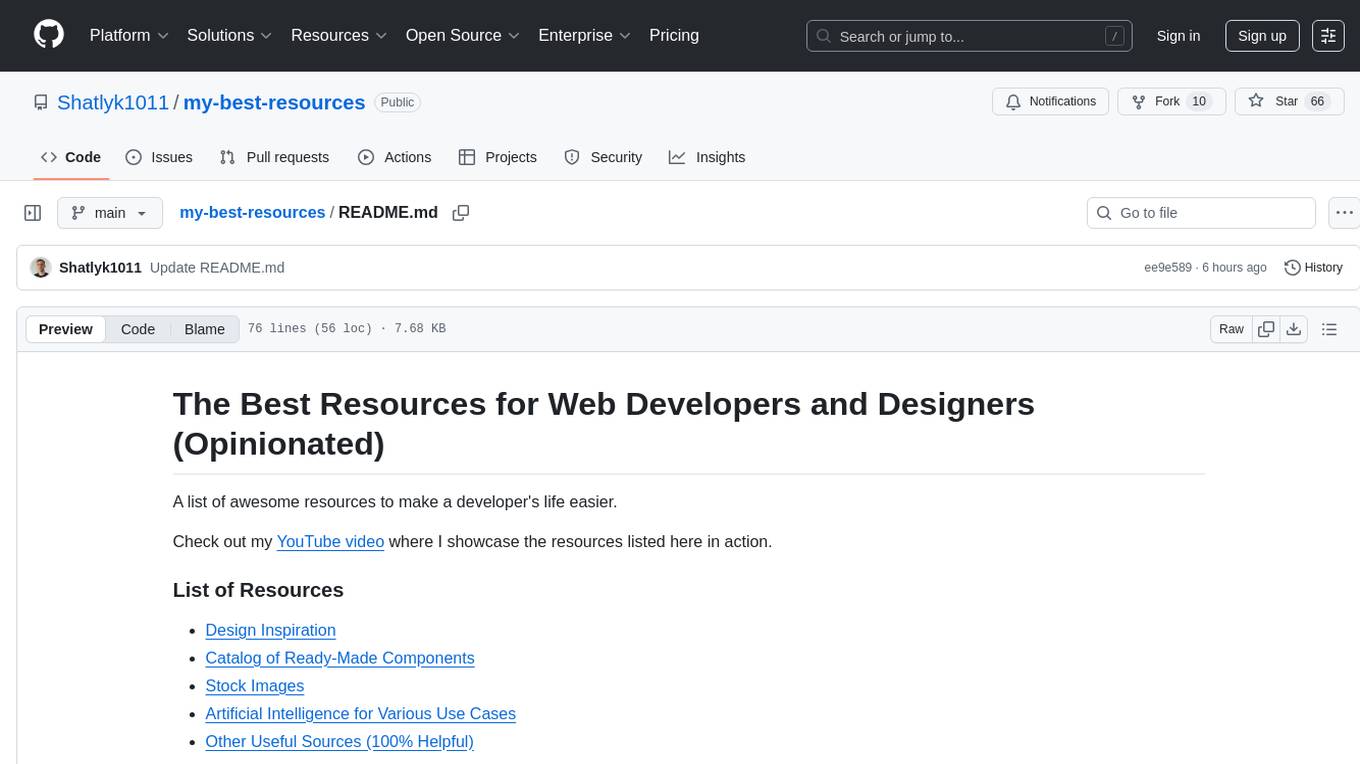
my-best-resources
my-best-resources is a curated list of resources for web developers and designers, aimed at making their lives easier. It includes sections on design inspiration, ready-made components, stock images, artificial intelligence tools for various use cases, and other useful sources. The repository provides links and descriptions for each resource, offering a valuable collection of tools and assets for web development and design projects.
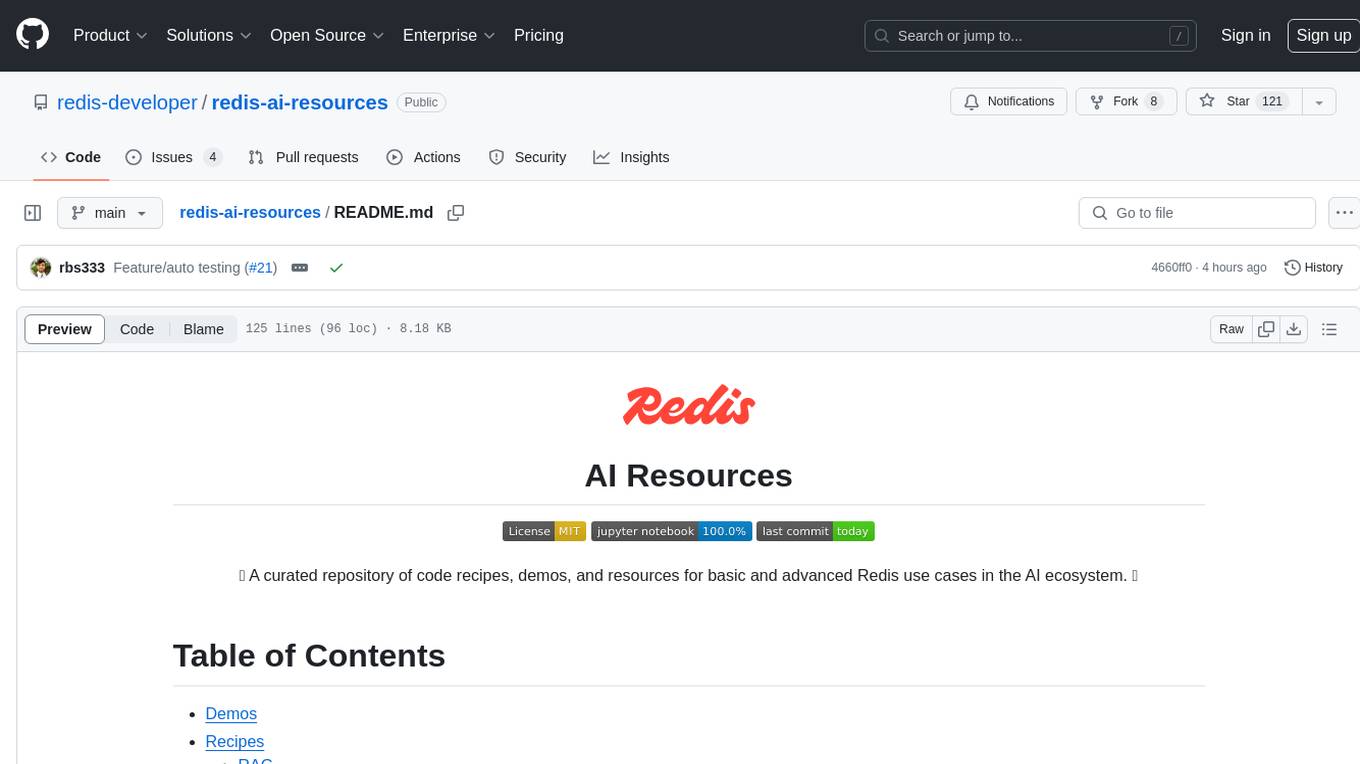
redis-ai-resources
A curated repository of code recipes, demos, and resources for basic and advanced Redis use cases in the AI ecosystem. It includes demos for ArxivChatGuru, Redis VSS, Vertex AI & Redis, Agentic RAG, ArXiv Search, and Product Search. Recipes cover topics like Getting started with RAG, Semantic Cache, Advanced RAG, and Recommendation systems. The repository also provides integrations/tools like RedisVL, AWS Bedrock, LangChain Python, LangChain JS, LlamaIndex, Semantic Kernel, RelevanceAI, and DocArray. Additional content includes blog posts, talks, reviews, and documentation related to Vector Similarity Search, AI-Powered Document Search, Vector Databases, Real-Time Product Recommendations, and more. Benchmarks compare Redis against other Vector Databases and ANN benchmarks. Documentation includes QuickStart guides, official literature for Vector Similarity Search, Redis-py client library docs, Redis Stack documentation, and Redis client list.

free-for-life
A massive list including a huge amount of products and services that are completely free! ⭐ Star on GitHub • 🤝 Contribute # Table of Contents * APIs, Data & ML * Artificial Intelligence * BaaS * Code Editors * Code Generation * DNS * Databases * Design & UI * Domains * Email * Font * For Students * Forms * Linux Distributions * Messaging & Streaming * PaaS * Payments & Billing * SSL
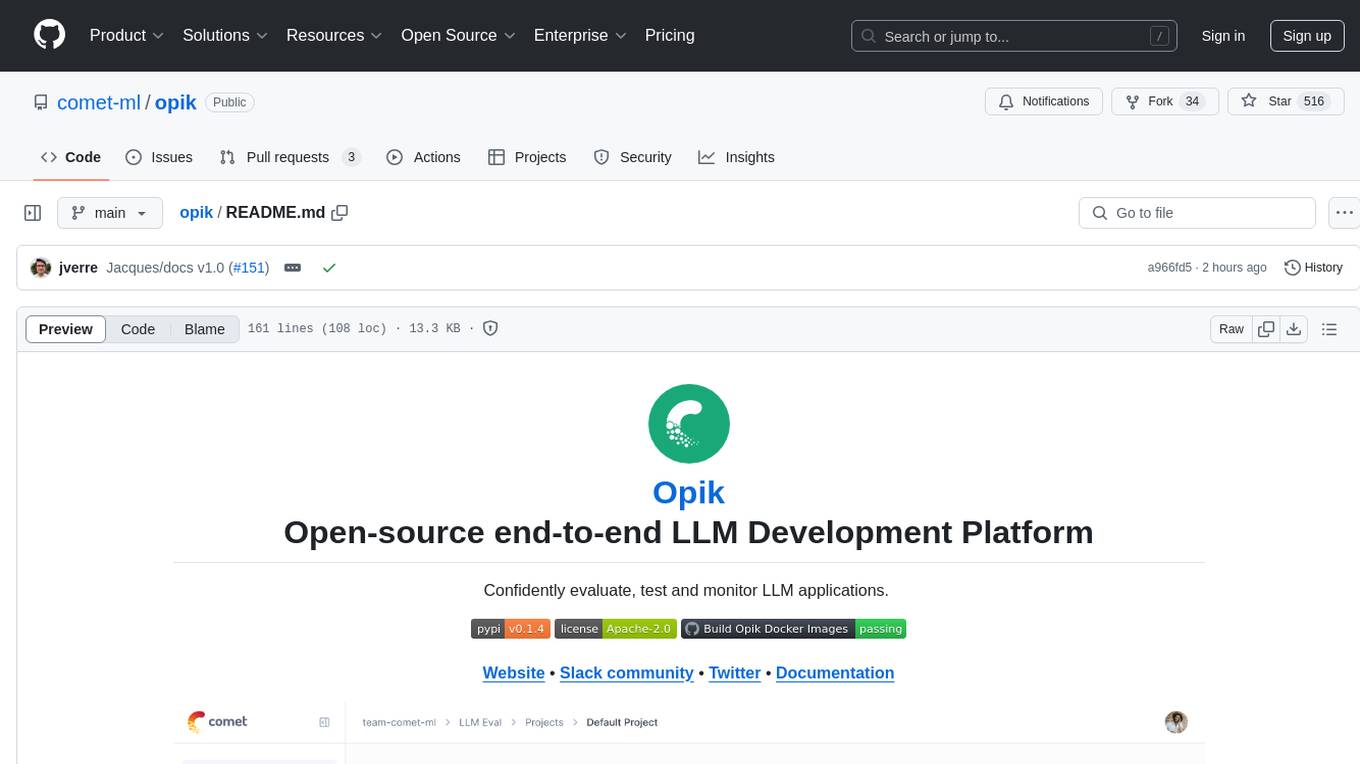
opik
Comet Opik is a repository containing two main services: a frontend and a backend. It provides a Python SDK for easy installation. Users can run the full application locally with minikube, following specific installation prerequisites. The repository structure includes directories for applications like Opik backend, with detailed instructions available in the README files. Users can manage the installation using simple k8s commands and interact with the application via URLs for checking the running application and API documentation. The repository aims to facilitate local development and testing of Opik using Kubernetes technology.
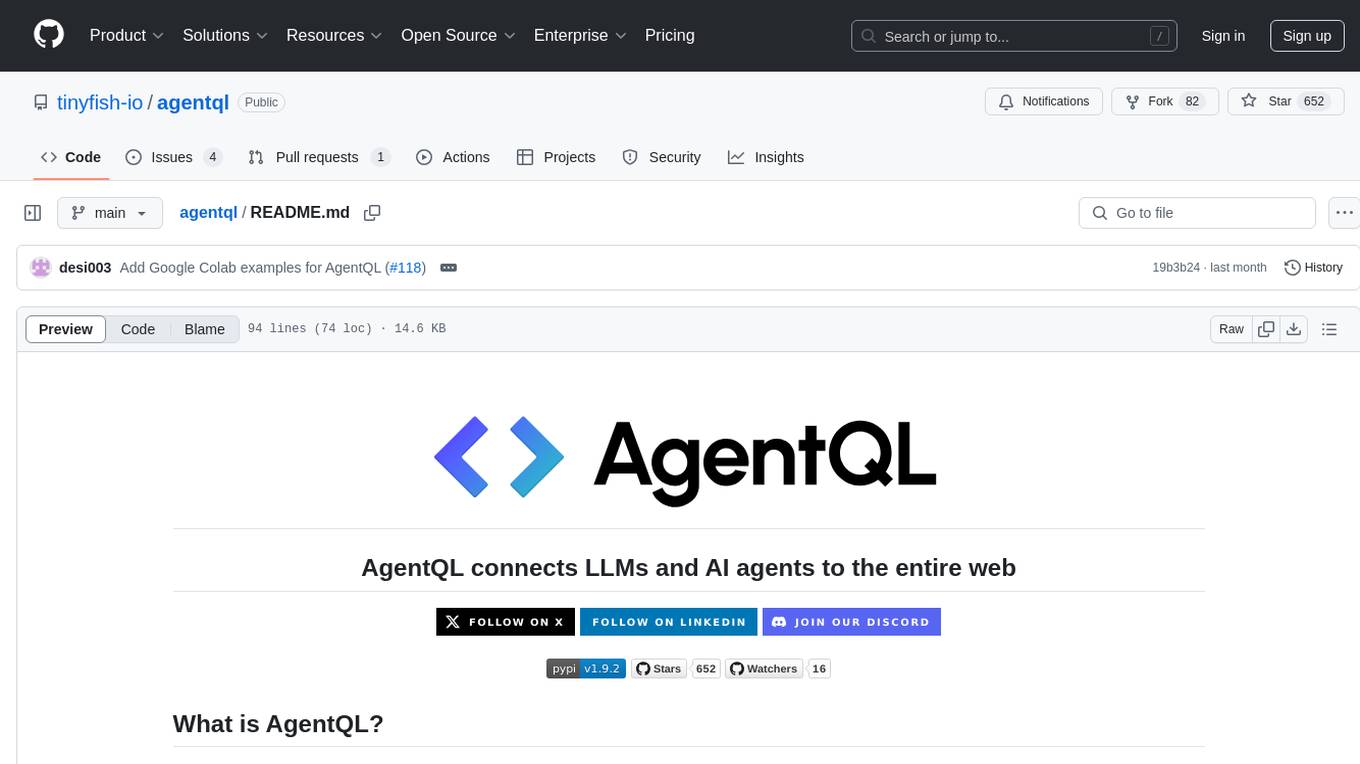
agentql
AgentQL is a suite of tools for extracting data and automating workflows on live web sites featuring an AI-powered query language, Python and JavaScript SDKs, a browser-based debugger, and a REST API endpoint. It uses natural language queries to pinpoint data and elements on any web page, including authenticated and dynamically generated content. Users can define structured data output and apply transforms within queries. AgentQL's natural language selectors find elements intuitively based on the content of the web page and work across similar web sites, self-healing as UI changes over time.
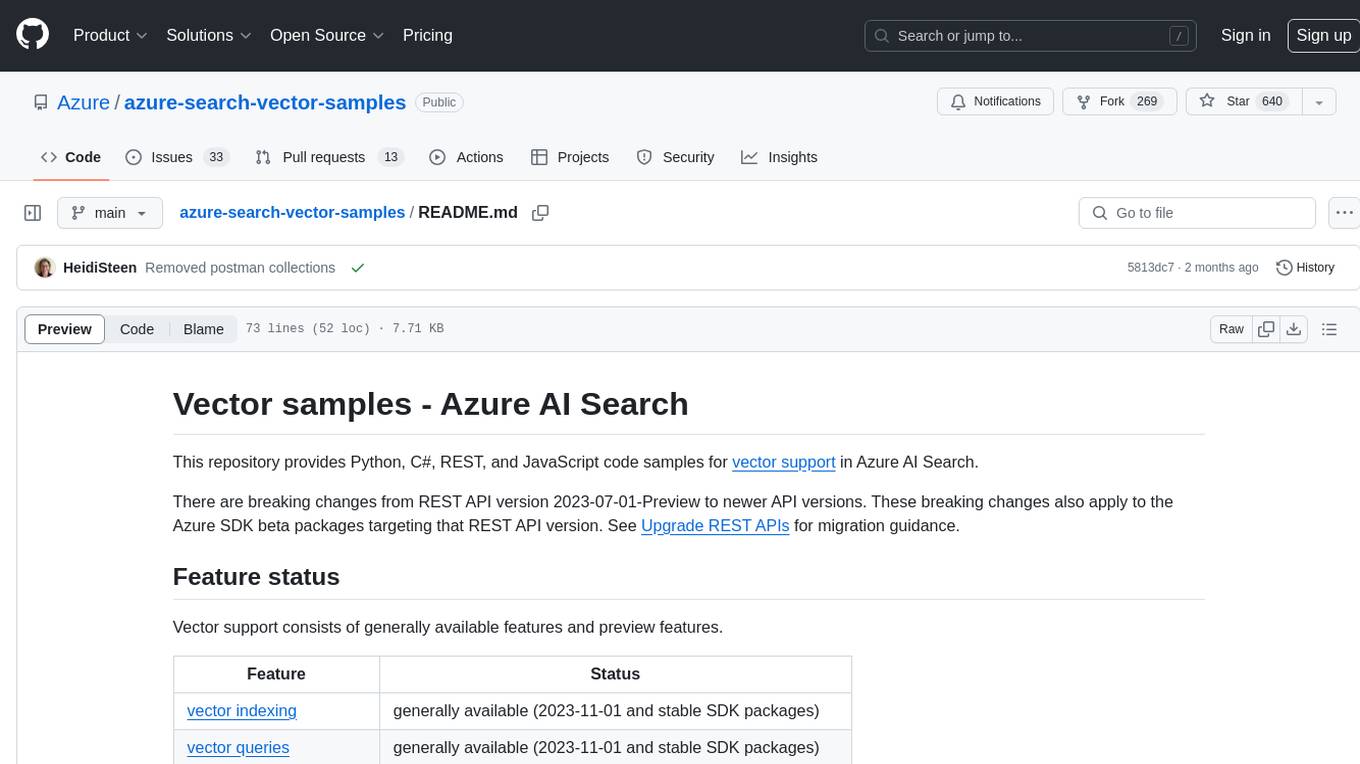
azure-search-vector-samples
This repository provides code samples in Python, C#, REST, and JavaScript for vector support in Azure AI Search. It includes demos for various languages showcasing vectorization of data, creating indexes, and querying vector data. Additionally, it offers tools like Azure AI Search Lab for experimenting with AI-enabled search scenarios in Azure and templates for deploying custom chat-with-your-data solutions. The repository also features documentation on vector search, hybrid search, creating and querying vector indexes, and REST API references for Azure AI Search and Azure OpenAI Service.
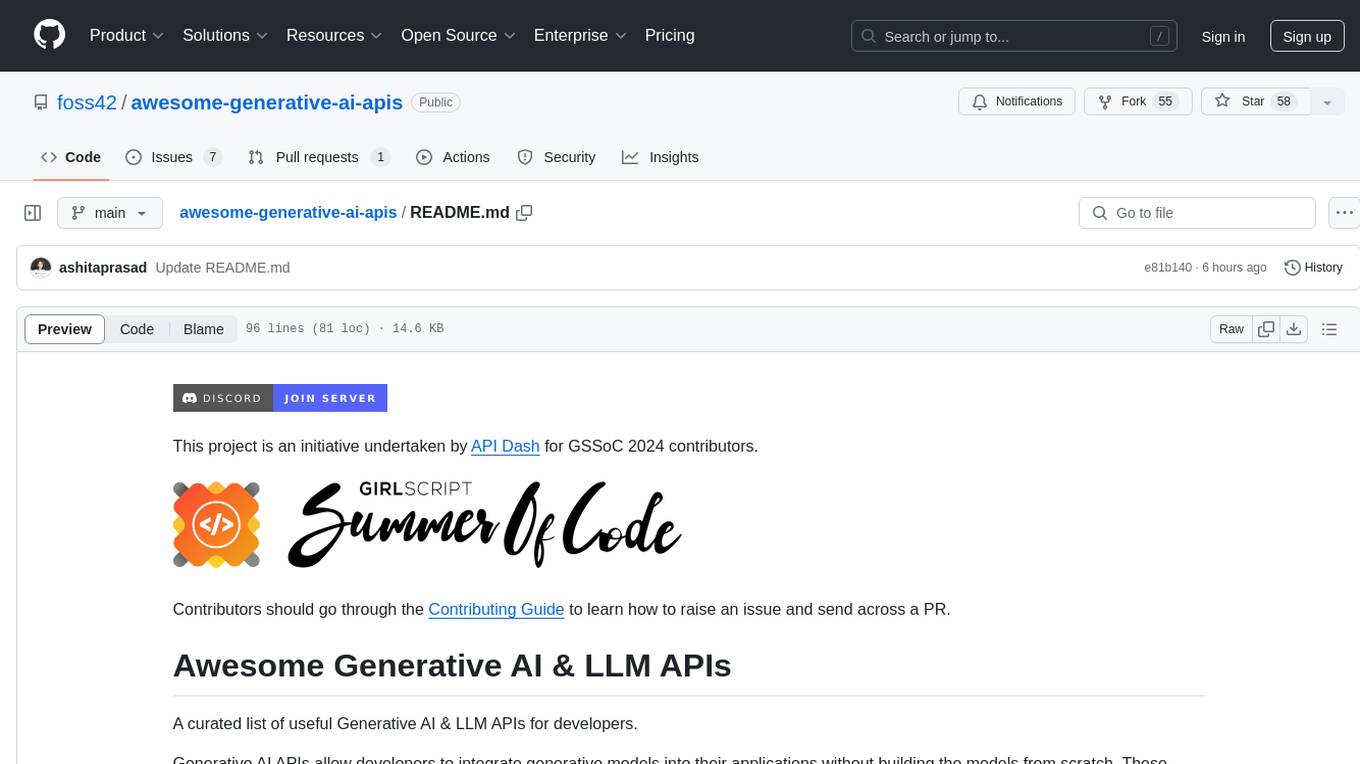
awesome-generative-ai-apis
Awesome Generative AI & LLM APIs is a curated list of useful APIs that allow developers to integrate generative models into their applications without building the models from scratch. These APIs provide an interface for generating text, images, or other content, and include pre-trained language models for various tasks. The goal of this project is to create a hub for developers to create innovative applications, enhance user experiences, and drive progress in the AI field.
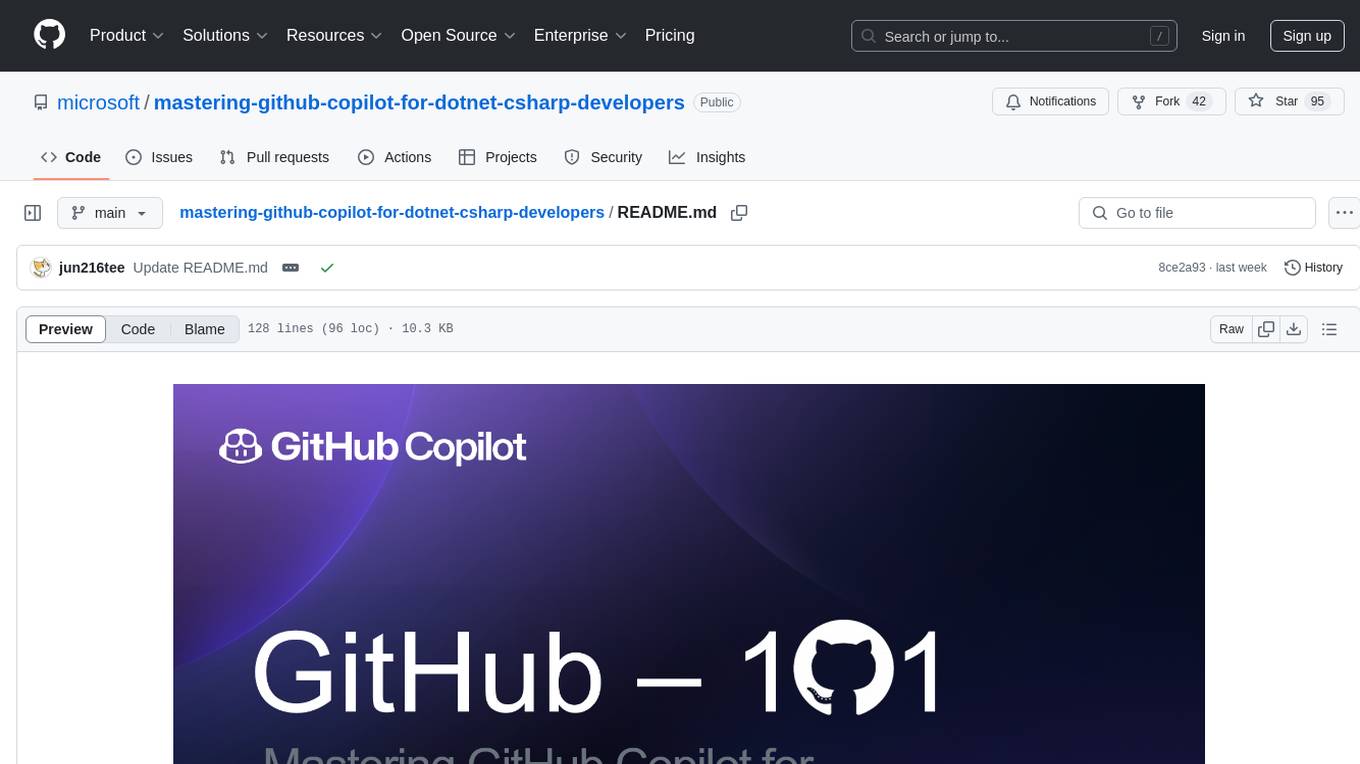
mastering-github-copilot-for-dotnet-csharp-developers
Enhance coding efficiency with expert-led GitHub Copilot course for C#/.NET developers. Learn to integrate AI-powered coding assistance, automate testing, and boost collaboration using Visual Studio Code and Copilot Chat. From autocompletion to unit testing, cover essential techniques for cleaner, faster, smarter code.
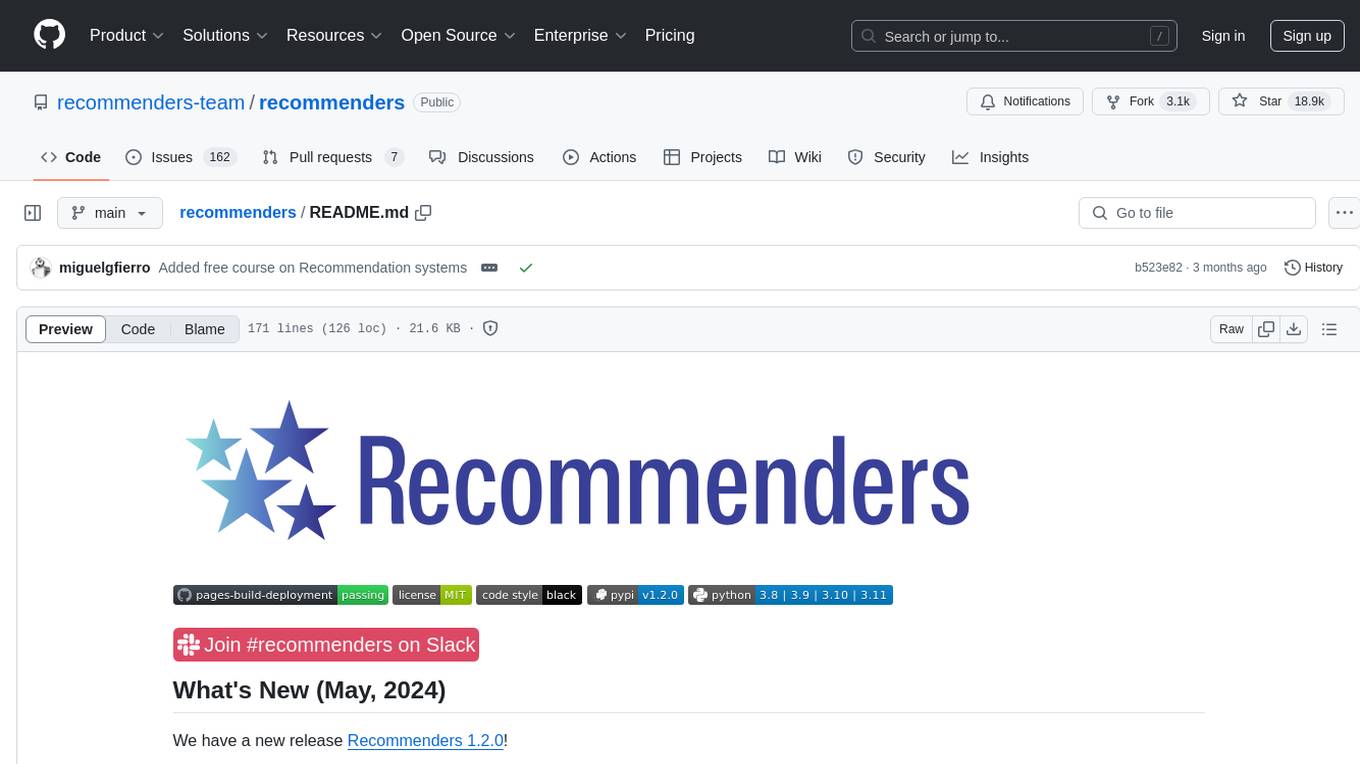
recommenders
Recommenders is a project under the Linux Foundation of AI and Data that assists researchers, developers, and enthusiasts in prototyping, experimenting with, and bringing to production a range of classic and state-of-the-art recommendation systems. The repository contains examples and best practices for building recommendation systems, provided as Jupyter notebooks. It covers tasks such as preparing data, building models using various recommendation algorithms, evaluating algorithms, tuning hyperparameters, and operationalizing models in a production environment on Azure. The project provides utilities to support common tasks like loading datasets, evaluating model outputs, and splitting training/test data. It includes implementations of state-of-the-art algorithms for self-study and customization in applications.
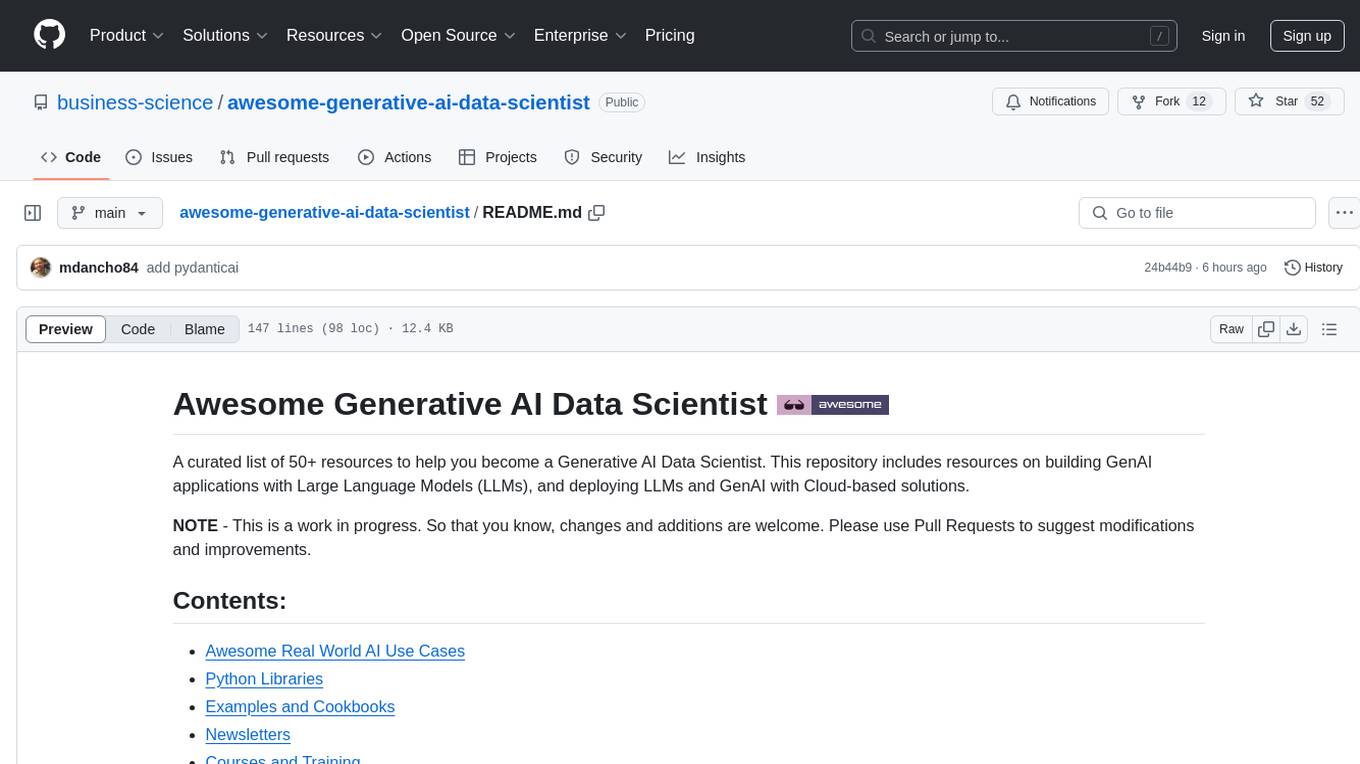
awesome-generative-ai-data-scientist
A curated list of 50+ resources to help you become a Generative AI Data Scientist. This repository includes resources on building GenAI applications with Large Language Models (LLMs), and deploying LLMs and GenAI with Cloud-based solutions.
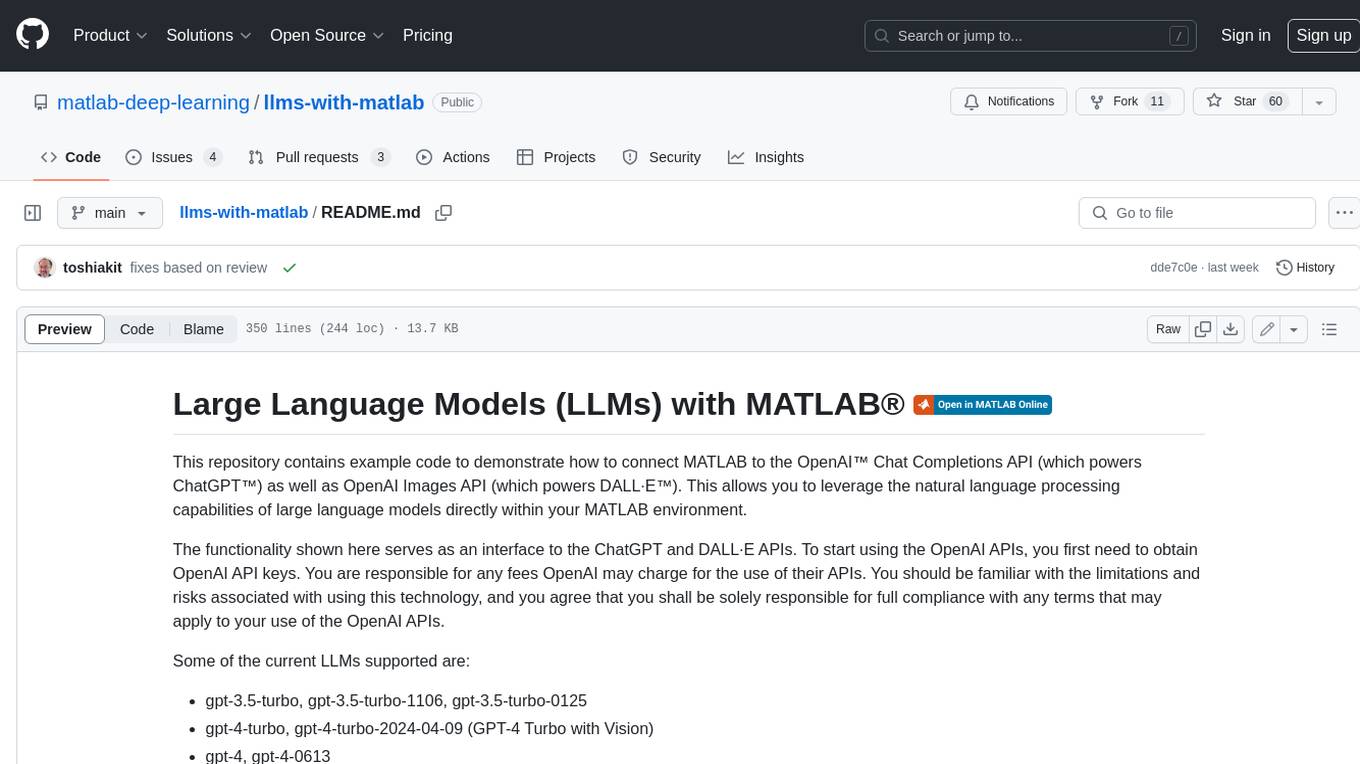
llms-with-matlab
This repository contains example code to demonstrate how to connect MATLAB to the OpenAI™ Chat Completions API (which powers ChatGPT™) as well as OpenAI Images API (which powers DALL·E™). This allows you to leverage the natural language processing capabilities of large language models directly within your MATLAB environment.
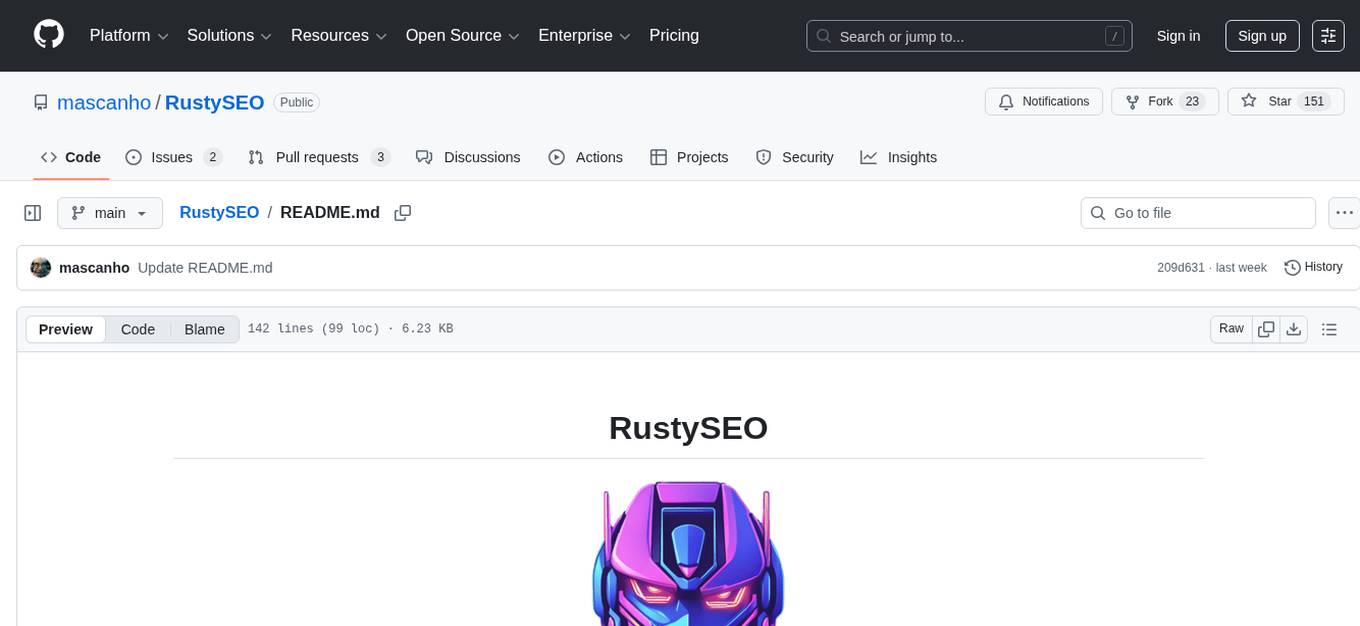
RustySEO
RustySEO is a free, modern SEO/GEO toolkit designed to help users crawl and analyze websites and server logs without crawl limits. It is an all-in-one, cross-platform marketing toolkit for comprehensive SEO & GEO analysis, providing actionable insights into marketing and SEO strategies. The tool offers features such as shallow & deep crawl, technical diagnostics, on-page SEO analysis, dashboards, reporting, topic and keyword generators, AI chatbot, crawl history, image conversion and optimization, and more. RustySEO aims to be a robust, free alternative to costly commercial SEO tools, with integrations like Google PageSpeed Insights, Google Gemini, and more.
For similar tasks

Azure-Analytics-and-AI-Engagement
The Azure-Analytics-and-AI-Engagement repository provides packaged Industry Scenario DREAM Demos with ARM templates (Containing a demo web application, Power BI reports, Synapse resources, AML Notebooks etc.) that can be deployed in a customer’s subscription using the CAPE tool within a matter of few hours. Partners can also deploy DREAM Demos in their own subscriptions using DPoC.

sorrentum
Sorrentum is an open-source project that aims to combine open-source development, startups, and brilliant students to build machine learning, AI, and Web3 / DeFi protocols geared towards finance and economics. The project provides opportunities for internships, research assistantships, and development grants, as well as the chance to work on cutting-edge problems, learn about startups, write academic papers, and get internships and full-time positions at companies working on Sorrentum applications.

tidb
TiDB is an open-source distributed SQL database that supports Hybrid Transactional and Analytical Processing (HTAP) workloads. It is MySQL compatible and features horizontal scalability, strong consistency, and high availability.

zep-python
Zep is an open-source platform for building and deploying large language model (LLM) applications. It provides a suite of tools and services that make it easy to integrate LLMs into your applications, including chat history memory, embedding, vector search, and data enrichment. Zep is designed to be scalable, reliable, and easy to use, making it a great choice for developers who want to build LLM-powered applications quickly and easily.

telemetry-airflow
This repository codifies the Airflow cluster that is deployed at workflow.telemetry.mozilla.org (behind SSO) and commonly referred to as "WTMO" or simply "Airflow". Some links relevant to users and developers of WTMO: * The `dags` directory in this repository contains some custom DAG definitions * Many of the DAGs registered with WTMO don't live in this repository, but are instead generated from ETL task definitions in bigquery-etl * The Data SRE team maintains a WTMO Developer Guide (behind SSO)

mojo
Mojo is a new programming language that bridges the gap between research and production by combining Python syntax and ecosystem with systems programming and metaprogramming features. Mojo is still young, but it is designed to become a superset of Python over time.

pandas-ai
PandasAI is a Python library that makes it easy to ask questions to your data in natural language. It helps you to explore, clean, and analyze your data using generative AI.

databend
Databend is an open-source cloud data warehouse that serves as a cost-effective alternative to Snowflake. With its focus on fast query execution and data ingestion, it's designed for complex analysis of the world's largest datasets.
For similar jobs

weave
Weave is a toolkit for developing Generative AI applications, built by Weights & Biases. With Weave, you can log and debug language model inputs, outputs, and traces; build rigorous, apples-to-apples evaluations for language model use cases; and organize all the information generated across the LLM workflow, from experimentation to evaluations to production. Weave aims to bring rigor, best-practices, and composability to the inherently experimental process of developing Generative AI software, without introducing cognitive overhead.

LLMStack
LLMStack is a no-code platform for building generative AI agents, workflows, and chatbots. It allows users to connect their own data, internal tools, and GPT-powered models without any coding experience. LLMStack can be deployed to the cloud or on-premise and can be accessed via HTTP API or triggered from Slack or Discord.

VisionCraft
The VisionCraft API is a free API for using over 100 different AI models. From images to sound.

kaito
Kaito is an operator that automates the AI/ML inference model deployment in a Kubernetes cluster. It manages large model files using container images, avoids tuning deployment parameters to fit GPU hardware by providing preset configurations, auto-provisions GPU nodes based on model requirements, and hosts large model images in the public Microsoft Container Registry (MCR) if the license allows. Using Kaito, the workflow of onboarding large AI inference models in Kubernetes is largely simplified.

PyRIT
PyRIT is an open access automation framework designed to empower security professionals and ML engineers to red team foundation models and their applications. It automates AI Red Teaming tasks to allow operators to focus on more complicated and time-consuming tasks and can also identify security harms such as misuse (e.g., malware generation, jailbreaking), and privacy harms (e.g., identity theft). The goal is to allow researchers to have a baseline of how well their model and entire inference pipeline is doing against different harm categories and to be able to compare that baseline to future iterations of their model. This allows them to have empirical data on how well their model is doing today, and detect any degradation of performance based on future improvements.

tabby
Tabby is a self-hosted AI coding assistant, offering an open-source and on-premises alternative to GitHub Copilot. It boasts several key features: * Self-contained, with no need for a DBMS or cloud service. * OpenAPI interface, easy to integrate with existing infrastructure (e.g Cloud IDE). * Supports consumer-grade GPUs.

spear
SPEAR (Simulator for Photorealistic Embodied AI Research) is a powerful tool for training embodied agents. It features 300 unique virtual indoor environments with 2,566 unique rooms and 17,234 unique objects that can be manipulated individually. Each environment is designed by a professional artist and features detailed geometry, photorealistic materials, and a unique floor plan and object layout. SPEAR is implemented as Unreal Engine assets and provides an OpenAI Gym interface for interacting with the environments via Python.

Magick
Magick is a groundbreaking visual AIDE (Artificial Intelligence Development Environment) for no-code data pipelines and multimodal agents. Magick can connect to other services and comes with nodes and templates well-suited for intelligent agents, chatbots, complex reasoning systems and realistic characters.
